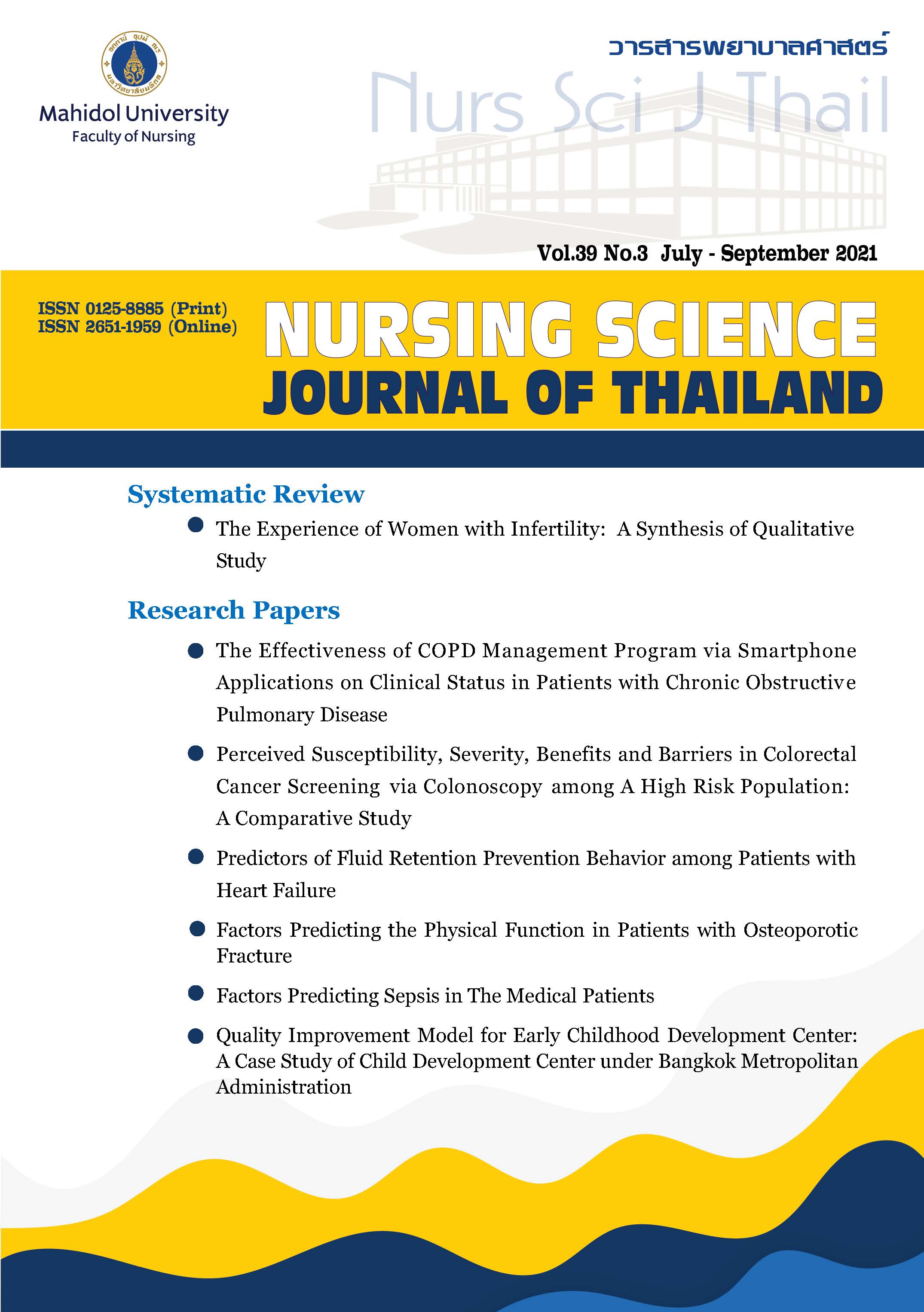รูปแบบการพัฒนาคุณภาพสถานพัฒนาเด็กปฐมวัย กรณีศึกษาศูนย์พัฒนาเด็กก่อนวัยเรียนแห่งหนึ่งสังกัดกรุงเทพมหานคร
Main Article Content
บทคัดย่อ
วัตถุประสงค์: เพื่อพัฒนารูปแบบการพัฒนาคุณภาพสถานพัฒนาเด็กปฐมวัย สังกัดกรุงเทพมหานคร
รูปแบบการวิจัย: การวิจัยเชิงปฏิบัติการแบบมีส่วนร่วม ที่ศูนย์พัฒนาเด็กก่อนวัยเรียน กรุงเทพมหานคร แห่งหนึ่ง
วิธีดำเนินการวิจัย: เลือกกลุ่มตัวอย่างแบบเจาะจงได้กลุ่มตัวอย่าง 12 คน ประกอบด้วย อาสาสมัครผู้ดูแลเด็ก ผู้ปกครอง ประธานชุมชน เจ้าหน้าที่สาธารณสุข และเจ้าหน้าที่สำนักงานเขต เก็บข้อมูลโดยการศึกษาเอกสาร สัมภาษณ์เชิงลึก และสนทนากลุ่ม เครื่องมือที่ใช้เป็นหลักในการดำเนินกิจกรรมการประเมินคุณภาพอย่างมีส่วนร่วม คือ มาตรฐานสถานพัฒนาเด็กปฐมวัยแห่งชาติ โดยให้กลุ่มตัวอย่างประเมิน 3 ครั้ง ครั้งที่ 1 ก่อนเข้าร่วมโครงการ ครั้งที่ 2 ภายหลังดำเนินการในเดือนที่ 4 และครั้งที่ 3 เมื่อสิ้นสุดโครงการเดือนที่ 9 วิเคราะห์ข้อมูลโดยใช้ความถี่ ร้อยละ และการวิเคราะห์เชิงเนื้อหา
ผลการวิจัย: รูปแบบการพัฒนาคุณภาพสถานพัฒนาเด็กปฐมวัย ประกอบด้วย 6 ขั้นตอน 1) การประเมินตนเอง 2) การเสริมพลังการเปลี่ยนแปลง 3) การคิดทบทวนทำให้ดีขึ้น 4) การให้ความรู้และทักษะการดูแลเด็กปฐมวัย 5) การทดลองปฏิบัติ และ 6) การแก้ไขปรับปรุง ผลการประเมินตนเองตามมาตรฐานสถานพัฒนาเด็กปฐมวัยแห่งชาติเพิ่มขึ้นทั้ง 3 ด้าน มาตรฐานด้านที่ 1 การบริหารจัดการสถานพัฒนาเด็กปฐมวัยจากร้อยละ 26.9 เป็น 51.3 และ 76.9 ตามลำดับ ด้านที่ 2 ครู/ผู้ดูแลเด็กให้การดูแล และจัดประสบการณ์การเรียนรู้และการเล่นเพื่อพัฒนาเด็กปฐมวัย จากร้อยละ 11.7 เป็น 18.3 และ 68.3 ตามลำดับ และด้านที่ 3 คุณภาพเด็กปฐมวัยจากร้อยละ 9.1 เป็น 9.1 และ 69.8 ตามลำดับ
สรุปและข้อเสนอแนะ: การพัฒนาคุณภาพที่เกิดจากการมีส่วนร่วมในการประเมินตนเอง เสริมพลังการเปลี่ยนแปลง คิดทบทวนทำให้ดีขึ้น เป็นขั้นตอนแรกที่สำคัญที่จะช่วยให้ผู้ที่เกี่ยวข้องพร้อมจะพัฒนาและยกระดับการพัฒนาคุณภาพสถานพัฒนาเด็กปฐมวัยให้มีมาตรฐานอย่างยั่งยืน บุคลากรทางสุขภาพสามารถเป็นส่วนหนึ่งของกระบวนการพัฒนาแบบมีส่วนร่วม ทำให้ศูนย์พัฒนาเด็กก่อนวัยเรียนมีคุณภาพ ส่งผลให้เด็กปฐมวัยได้รับการดูแลที่ดี มีการเจริญเติบโตและพัฒนาการสมวัย
Article Details
ลิขสิทธิ์: วารสารพยาบาลศาสตร์เป็นเจ้าของลิขสิทธิ์ในการเผยแพร่ผลงานที่ตีพิมพ์ ห้ามผู้ใดนำบทความที่ได้รับการตีพิมพ์ในวารสารพยาบาลศาสตร์ไปเผยแพร่ในลักษณะต่างๆ ดังต่อไปนี้ การส่งบทความไปตีพิมพ์เผยแพร่ที่อื่น การนำบทความเผยแพร่ออนไลน์ การถ่ายเอกสารบทความเพื่อกิจกรรมที่ไม่ใช่การเรียนการสอน ยกเว้นเสียแต่ได้รับอนุญาตจากวารสารพยาบาลศาสตร์

Disclaimer: เนื้อหาบทความหรือข้อคิดเห็นใดๆ ในวารสารพยาบาลศาสตร์ ถือเป็นความรับผิดชอบของผู้เขียน กองบรรณาธิการไม่จำเป็นต้องเห็นด้วยและไม่มีส่วนรับผิดชอบแต่อย่างใด
เอกสารอ้างอิง
National Economic and Social Development Board, Office of the Prime Minister. The twelfth national economic and social development plan (2017-2021) [Internet]. Bangkok: National Economic and Social Development Board; 2016 [cited 2020 Sep 30]. Available from: https://www.nesdc.go.th/ewt_dl_link.php?nid=6422. (in Thai).
National Economic and Social Development Board. The national strategy (2018-2037) Sustain Development Goals: SDGs [Internet]. Bangkok: National Economic and Social Development Board; 2015 [cited 2020 Sep 30]. Available from: https://www.un.or.th/globalgoals/th/global-goals/quality-education. (in Thai).
Strategy and Planning Division, Office of the Permanent Secretary, Ministry of Public Health. Twenty-year national strategic plan for public health (2017-2036): first revision 2018 [Internet]. Nonthaburi: Strategy and Planning Division, Office of the Permanent Secretary Ministry of Public Health; 2016 [cited 2020 Sep 30]. Available from: https://waa.inter.nstda.or.th/stks/pub/2017/20171117-MinistryofPublicHealth.pdf. (in Thai).
Office of the Education Council. National standard for early childhood care, development and education Thailand. Bangkok: Prigwhan Graphic; 2019. 55 p. (in Thai).
Social Development Department, Bangkok Metropolitan Administrator. The information about the number of children within early childhood care Bangkok [Internet]. Bangkok: Social Development Department, Bangkok Metropolitan Administrator; 2019 [cited 2020 Oct 30]. Available from: http://www.bangkok.go.th/social/page/sub/13707/สถิติข้อมูลชุมชนของกรุงเทพมหานคร. (in Thai).
National Statistical Office, National Health Security Office, UNICEF. Complete report: survey of the situation of children and woman in Thailand 2015-2016 [Internet]. Bangkok: National Statistical Office; 2016 [cited 2020 Sep 30]. Available from: http://doh.hpc.go.th/data/mch/MICS5_full_th.pdf. (in Thai).
AUTOMATED QA [Internet]. Bangkok: The Office for National Education Standards and Quality Assessment (Public Organization); c2011 [updated 2011; cited 2020 Oct 20]. Available from: https://aqa.onesqa.or.th/SummaryReport.aspx. (in Thai).
Jiawiwatkul U. Participatory action research: key concepts and lessons. Bangkok: P.S. Livingston; 2010. 116 p. (in Thai).
Phatanaphongpthon J, Boonsuwan C, Thanacharoenwat N. The study of Thai early child development [Internet]. Nonthaburi: Maternal and Child Health Group, Office of Health Promotion, Department of Health, Ministry of Public Health; 2015 [cited 2019 May 20]. Available from: http://hp.anamai.moph.go.th/ewt_dl_link.php?nid=1524. (in Thai).
Rattanan Y. The study factors affecting children’s development in the eight-health area [Internet]. Khon Kaen: Regional Health Center 7 Khon Kaen; 2016 [cited 2020 Oct 20]. Available from: http://203.157.71.148/hpc7data/Res/ResFile/2560001201.pdf. (in Thai).
Phongphetdit B, Authawee B. Factors affecting the development of early childhood Thailand: public health region 5. Kuakarun Journal of Nursing. 2020;27(1):59-70. (in Thai).
Ruzek E, Burchinal M, Farkas G, Duncan GJ. The quality of toddler child care and cognitive skills at 24 months: propensity score analysis results from the ECLS-B. Early Child Res Q. 2014;28(1):10.1016/j.ecresq.2013.09.002. doi: 10.1016/j.ecresq.2013.09.002.
Nimit-arnun N, Klinhom W, Morsup T. Community empowerment: concept and applications in community practitioner nursing practice. Journal of Nursing and Health Sciences. 2020;14(1):13-23. (in Thai).
Hanrungcharotorn U. Community empowerment. Journal of Nursing Science Naresuan University. 2008;2 Special:1-5. (in Thai).
Jehnok M, Jeharsae R. Effects of the participatory developmental stimulation program for care takers on development status of 2-5 years old children. Academic Services Journal, Prince of Songkla University. 2019;30(2):80-8. (in Thai). doi: 10.14456/asj-psu.2019.29.
Robbin SP, Judge TA. Organizational behavior. 15th ed. Boston, MA: Pearson; 2013. 676 p.


